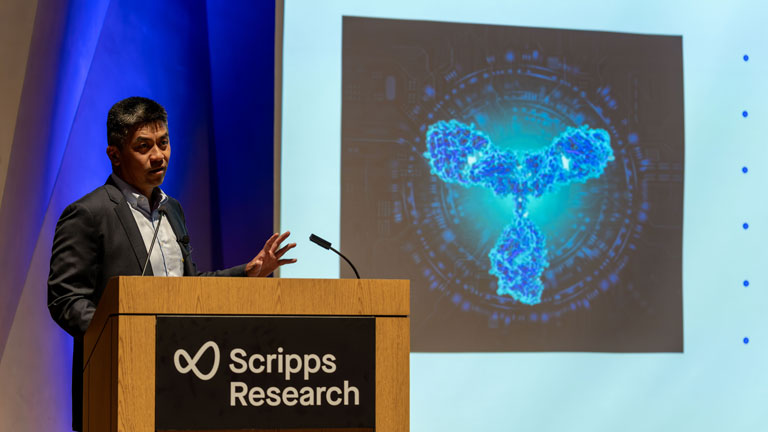Front Row lecture series
Forging the Future of Biomedical Innovation
Calibr-Skaggs: Arnab Chatterjee, PhD, VP of Medicinal Chemistry | Kristen Johnson, PhD, Principal Investigator, Biology | Travis Young, PhD, VP of Biologics
Preventing malaria, a global health threat
Throughout his productive career, Arnab Chatterjee has employed ingenuity and experience to develop novel therapeutics for respiratory and infectious diseases, neurological conditions, regenerative medicine, fibrosis and cancer. He and his teams at the Calibr-Skaggs Institute for Innovative Medicines have created eight preclinical drug candidates to date, with three currently in clinical trials.
While they often create entirely new molecules, Chatterjee and his colleagues also solve the technical challenges that sometimes stall the development of known molecules. One of his resources at Calibr-Skaggs is the ReFRAME library of more than 12,000 drugs already proven safe in humans but often forgotten or neglected by researchers. These drugs can often be quickly repurposed to treat other diseases. Recently, Chatterjee and the Calibr-Skaggs team identified a drug originally designed to treat leprosy and were able to repurpose it as an effective treatment for childhood diarrhea, a life-threatening illness. The drug proceeded from lab to clinical trial in only three years.
Chatterjee earned his bachelor’s degree in chemistry at Northwestern University and his doctoral degree in chemistry from the California Institute of Technology. Following completion of his doctoral research, Chatterjee joined the Genomics Institute of the Novartis Research Foundation, then became a founding member of Calibr-Skaggs in 2012.
Regenerative medicine for osteoarthritis
Kristen Johnson leads a team of scientists who envision, create and execute high-throughput screening assays to identify molecules with the potential to modify human diseases. Her team focuses on harnessing the immune system to create new potential therapeutics for patients with cancer, neurodegeneration and autoimmune diseases. Johnson and her team are also unraveling the mechanisms behind a new class of drugs that target RNA instead of proteins to potentially design medicines for previously “undruggable” diseases.
Each project entails targeted and phenotypic approaches and often uses patient-derived cells to model the diseases of interest. Leads from the screening campaigns are further investigated to gain a detailed understanding of how the molecules work to improve the diseased cell in parallel to the medicinal chemistry efforts to optimize the molecules for preclinical studies for safety and efficacy.
Johnson currently leads an $8.4M CIRM-funded grant for the phase 1 clinical study of KA34, a novel drug developed at Calibr which promotes the regeneration of cartilage in the knee. KA34 represents one of the first potential disease-modifying drugs for osteoarthritis, offering patients with the painful condition an alternative to surgery.
Johnson earned her bachelor’s degree in biology at Point Loma Nazarene University and her doctoral degree in molecular pathology at the University of California, San Diego. Prior to joining Calibr, she worked in drug discovery at the Genomics Institute of the Novartis Research Foundation.
Harnessing immunity to treat cancer
Immuno-oncology, an innovative field that harnesses the body’s own immune system to fight cancer, is where Travis Young is making great inroads. He and his team at Calibr have developed a novel approach to gene therapy for cancer based on a promising treatment known as CAR T-cell therapy. In this treatment, a patient’s immune cells are removed, genetically engineered to attack cancer cells, and returned to the patient’s body where they eliminate cancerous cells. Young’s team has made significant improvements to the safety and versatility of this therapy by creating a “remote control” for the cells. They’ve done this by designing an adapter molecule, or “switch,” that allows the cells to be turned on or off at will. Young’s team expects to test this remote-controlled CAR T-cell in lymphoma patients by the end of the year, but the approach may have a much broader impact in establishing a universal treatment that can be applied to nearly any tumor.
Prostate cancer afflicts more than 3 million men nationwide each year. To tackle the burden of metastatic prostate cancer, for which there is no cure, Young and his team have developed a novel immunotherapy known as a bispecific antibody. One arm of this antibody binds to a protein on the patient’s T-cell, while the other simultaneously binds to a surface marker expressed on cancer cells known as prostate-specific membrane antigen. In this way, the patient’s own immune system can be selectively redirected towards the tumor, and in doing so overcome the resistance often observed with chemotherapies. This innovative molecule, dubbed DUPA-CD3, is also expected to enter a clinical trial this year.
Young earned his bachelor’s degree in biochemistry from Boston College and his doctoral degree in chemical biology from the graduate school at Scripps Research. Following postdoctoral research at Harvard Medical School, he became a founding member of Calibr in 2012.
Presented: June 13, 2019




































































































































































